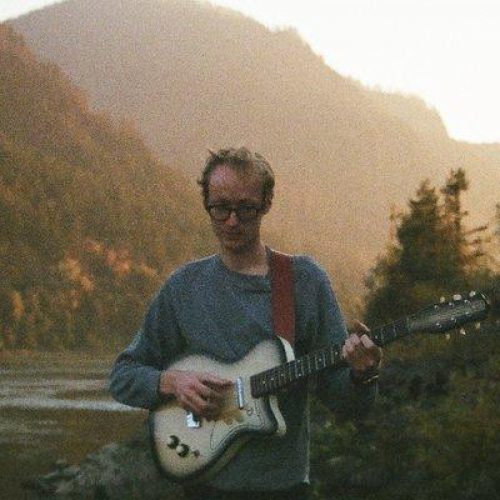Death is difficult to accept.
It doesn’t discriminate; it punishes the young and old, the good and bad. It takes one life but destroys many others. It reduces a living, breathing being to nothingness.
So when death chooses one of our loved ones, how do we deal with that?
Modern folk artist The Duke of Norfolk chooses to express his sorrow through music, using stirring instrumentals and lyricism to illustrate the bitterness that death leaves behind.
Music can convey sentiments that can’t be shaped into words. We hear Adam Howard’s grief in the blend of instruments that create a sombre, melancholy mood.
His lyricism adds to this mournful tone; he alludes to Dylan Thomas’ “Do not go gentle into that good night”, a poem about the death of his father. In referencing another work about death, Howard exhibits the different emotional reactions death can engender; anger and bitterness.
Howard has created a beautiful, affecting lament. You need not be in a doleful mood to enjoy “Dylan Thomas / Bitter Bitter.” Have a listen, and then check out our interview with Adam below to learn more about his songwriting process.
What is it about Irish traditional music that inspired you?
Hmmm… I think my favorite thing about traditional music in general is the same thing that I love about christmas music. There’s something of an anonymous quality to it, no one really knows who wrote Rudolph the Red-Nosed Reindeer but nearly everyone could sing it. The lack of obvious authorship makes the communal element more obvious. It’s all about the feeling that we share; the grief of loss, the feeling of love, the missing home, etc. Playing music sometimes feels self-indulgent, especially when writing from personal experience, and it helps me to remember the communal element where – though I may be writing about what I’m feeling – I can understand the general elements of human experience are so broadly shared that my writing about them simultaneously can make me feel less alone and can hopefully do the same for others.
Who are your biggest influences?
Recently Hermann Hesse and Kahlil Gibran. But GK Chesterton is a pervading influence on all my my work for the last few years and especially on my new album. Music-wise, I love everything that Sufjan Stevens makes, and I’ve been very influenced by his work as well as Bon Iver’s most recent album 22, A Million and everything that Wovoka Gentle has put out. I also really love This is the Kit and Rachel Sermanni and listen a good deal to both of them so I’m sure you could hear some of that in my music even if it’s not immediately evident.
Is your songwriting process organic or laborious?
Definitely organic. I think if it was really laborious I wouldn’t do it. Or at least, if I didn’t enjoy the labor of it, I wouldn’t do it. There are plenty of times that I’ve found myself playing a song over and over for hours upon hours revising and re-revising it, so there’s often labor involved but it happens without my having to make myself do it.
How has your music evolved since you first began writing songs?
Mostly I think in the fact that I’ve become more confident in it. I’ve become more confident in my writing and more confident as a performer. I’ve also gained some experiences and interests that have allowed me to bring in other sounds into my music. I think probably the period of most notable evolution would be while I was living in Scotland doing a Masters in Sound Design; the scottish music scene has had a notable influence on my music, and studying creative methods of processing sound gave me the tools to work in more interesting electronic elements to my recordings.
Many complex songs with various instruments start with simple chords on acoustic guitar or piano. What is your songwriting process?
I write pretty exclusively with an acoustic guitar. Most songs start with a thought or a phrase that came to me while on a walk or in a conversation or sometimes hearing someone speak (be it a lecture or someone talking between songs at a show).
Do you believe a song has to have meaning, or do you believe in art for art’s sake?
Honestly, I think that ‘art for art’s sake’ is meaning in itself. I don’t believe that a song has to have a specific meaning nor even that if it does that it has to have been intended from the beginning to be that, but art – and music especially – conveys emotion, so in that sense a song’s meaning could easily be ‘happy’ or ‘nostalgia’ or, more likely, a complex mix of emotions.
What advice would you give to other songwriters?
Don’t be discouraged by writing bad songs… you have to write bad songs to write good ones and, in some sense, you thinking your songs are bad is a sign that you have a full enough understanding of quality to write really good ones.
Describe the genesis of “Dylan Thomas / Bitter Bitter”.
I moved to Vancouver, WA – effectively a suburb of Portland, OR – to record this album, primarily about my experience of losing my father a year and a bit before. I had written most of the songs for the album but had a few gaps that I wanted to fill in. I was really interested in trying to incorporate a larger element of grieving into the album by referencing older texts about grief. Dylan Thomas has a really famous poem about the death of his father, Do Not Go Gentle Into That Good Night, so I began by trying to put music to his poem. As I continued to sing his poem, I added verses and changed them until the song became primarily my words with little blips of Thomas’s words thrown in. I was also worn down and beyond the anger of death so I replaced Thomas’s “rage against the dying of the light” with bitterness, because I felt bitter.
There is a beautiful recurrent melody in the song that is expressed with different instruments, including your voice. Which do you believe is more important in songs; the instrumentals or the lyrics?
I think one of the great things about music is that it can be a type of poetry where you get to affect the environment of the reader. With the music, you can dim the lights and make the clouds open in a downpour before delivering your verse about loss or you can choose soften the sadness with the hope of a sunny sound. I think they should work in tandem and, to that point, I would say I value them both equally. I think my strength lies more heavily on the side of lyricism so I tend to focus more on that side of things with the music serving primarily as a vessel for my words but, say, a song intended to make you want to dance doesn’t need to be rich in metaphor or complicated introspection to make you feel like moving. If that makes sense?
What’s your favorite line from the song?
Probably the middle verse:
Open the sky for me and cut out the heart;
the fruit does spoil the children’s laughter.
Bitter, bitter the blackest of arts.
What significance does the vocal sample at the start have on the song’s meaning?
The vocal sample at the beginning of the song is TS Eliot introducing his poem Journey of the Magi for a reading he did on BBC Radio in 1946. I wanted to use some part of that reading because I was really moved by the entanglement of birth & death in Eliot’s questioning at the end of that poem:
Were we led all that way for
Birth or Death? There was a Birth,
certainly,
We had evidence and no doubt. I had
seen birth and death,
But had thought they were different;
this Birth was
hard and bitter agony for us, like
Death, our death.
I made a piece for a film project that I worked on with Shetland poet/filmmaker Roseanne Watt that included the whole of that recording, which is sort of tangentially related to this album, so I decided against re-using a sample from the poem itself, but thought the introduction would be a good way to introduce the album. I think the sample emphasizes the older & greater-than-me element of the story of mourning which I hoped to work into the album; first, by beginning with someone else & someone else’s words then, second, because the word ‘Ariel’ comes from Hebrew meaning ‘Lion of God’ so how much older and larger-than-me could I get than the idea of divinity?
The song utilizes many different instruments. How do you make sure that your music is expressed in a variety of ways without it being overproduced?
I don’t really ever worry about my music being ‘overproduced’. I think I’m more concerned with the honesty expression and maybe that’s what overproduction is – some sort of dishonesty? Don’t really know, I guess I don’t make sure that it isn’t overproduced.
Is there any more new music in the works?
Yes! Very very soon, actually. Still solidifying the release schedule, but I have a collection of recordings that I nearly finished. But, without starting rumours, maybe as early as February.
Are there any touring plans we should know about?
Also a nebulous yes! Working on the tour schedule, but I should be in the southern states, New England, the Pacific Northwest, and some in Canada and Scotland this year. Sooo keep an eye on the currently bare http://thedukeofnorfolk.com/tour where all the shows should be listed once they’re all confirmed.










